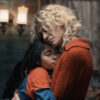Originally published in the Daily Texan on April 24, 2003.
"I'm paraphrasing, but I think it was Eudora Welty who said that in the South, we don't hide away our eccentrics; instead, we proudly parade them around in front of everybody," said Tim McCanlies, the writer and director of "Secondhand Lions." "I find most non-Texans boring by comparison. I frequently tell studio-executive types in Hollywood that I find your average beauty parlor operator in Texas to be far more interesting a person than your average studio-executive in Hollywood."
Perhaps that's why Hollywood executives have been interested in Texas for so long. And perhaps why so many Texans are interested in making films in the first place. Then there's those who try to stop them, which L.M. Kit Carson, the screenwriter of "Paris, Texas" learned firsthand when he went to a cocktail party after moving back to Dallas.
"Bob Wilson came up to me at the cocktail party and said, 'You've got to come talk to my kids, because they want to be in the movies, and you've got to talk them out of it.' So my wife, Cynthia Hargrave, and I went to the Wilsons' house for dinner and halfway through dinner, Luke and Owen left the table and came back with cardboard boxes full of posters and film memorabilia, and I said to Bob after dinner, 'Forget it, there's no way to keep them from making movies, because they're just obsessed with this.'"
Unsuccessful at convincing the brothers to go into another profession, Carson decided if you can't beat 'em, let them join you, and Luke and Owen Wilson accompanied him to the Sundance Film Festival in 1992. Though Carson would dismiss what eventually happened as a "non-recurring phenomenon," the introduction of the Wilson brothers at Sundance would be nearly as important to the third generation of Texas writer/directors as the introduction of Eagle Pennell to Sundance Film Festival founder Robert Redford. Pennell was the maverick independent director behind films such as "The Whole Shootin' Match" and "Last Night at the Alamo," during the second generation of Texas writers/directors in the late '70s.
"I told this story when I did the little Eagle Pennell salute down in Austin about Redford telling me that's what got him interested in supporting what was the U.S. Film Festival and turning it into Sundance, was watching on a sheet in a bar this black-and-white film about a couple of guys driving around in a pickup truck, which was called "The Whole Shootin' Match," said Carson. "And Redford said, 'I didn't know they made those anymore.' That's like Eagle's epitaph, 'I didn't know they made those anymore.'"
But like Pennell, Luke and Owen would eventually scrape enough money together to make a film with Wes Anderson that Carson and Hargrave produced called "Bottle Rocket." The heist comedy, which wasn't nearly as weighty as Pennell's films, made the trio a cause celebre in Hollywood and revived the glory of the Texas screenwriter with an off-kilter sense of humor and a camera lens big enough to capture the state's landscape.
"In this generation that Owen and Wes came out of," Carson said. "It was a very silent generation at the time; it was weary, it was skeptical of the world and, unlike the generation that I came up with – Scorsese and DePalma and Paul Schrader and all those guys who just wouldn't shut up – these people you hadn't heard from yet. And it was like all right, this is the first time anybody's heard from this generation."
"Dazed and Confused" director Richard Linklater offered a reason why those voices were waiting so long to come from the state. "Growing up in Texas at the time I was growing up, in the '60s and '70s, being a filmmaker from Texas was just not an option. It was not anything anyone talked about, it wasn't in the media that anyone could make a film, but back then, in my little town, a film would show up every Friday, and we would watch it, but it was in one little theater. So it certainly wasn't an option growing up to be a film person, and it wasn't until college that I even thought to be a filmmaker."
However, history and fate have decided otherwise. For Linklater, who said "all my stories grew out of my living and thinking here, so it feels natural for me," Texas has provided as large a canvas as can be found anywhere and a palate rich with colors. While the "Waking Life" director has put those resources to use literally, he ushered in a new generation of Texans – including Anderson and the Wilson Brothers, Robert Rodriguez, McCanlies and David Gordon Green – that have demonstrated that Texas is producing vast, atmospheric films that tell deeply personal stories with a resonance that everyone can relate to.
"Just in spending most of my life in Texas, there's so many colorful characters and places and diversity from Galveston to Amarillo," said Green. "It's all presented in a way where they're all places you want to stop and look at and listen to the way people talk, and to meet such a diversity of characters in such a diverse landscape is just eye-opening. Just the rhythms of life are unique, and it's a place that just lets you breathe; it's just a great place to go for a drive."
Some filmmakers like Catherine Hardwicke, whose debut film "Thirteen" earned her the best director award at Sundance this past year, are longing to do more than just drive.
"I grew up in McAllen, on the south Texas border," said Hardwicke. "And I'm dying to make a film about that area – my 'Wild West' border childhood has never been seen – I'd love to show it. Texas has big crazy characters and a big inspiring sky."
Texas film historian Frank Thompson believes the stories run as deep as the state's oil derricks. The author of numerous books on Texas film including Alamo Films and The Star Film Ranch: Texas' First Picture Show, Thompson even surprised the San Antonio film commission when his book Texas Hollywood: Filmmaking in San Antonio From 1910 uncovered over 300 films from the city versus 60 films that the film commission officially had on the books. As Thompson said, there's no limit on inspiration for potential filmmakers from the state.
"Texas comes with its own mystique," said Thompson. "You can't make up what Texas already is, so a filmmaker merely has to set a movie there, and the audience already comes in knowing that it's a special place in some way. There's also Texas history, which offers a tremendous number of stories as well as a tremendous amount of bullshit that you can take and run with and just about anything that you can take and make up, there's some true story somewhere in Texas history that can match it."
The Washington Post's film critic Ann Hornaday agrees.
"It's a literary tradition, it's a musical tradition, and there's a certain degree to which there's a cinematic tradition in that," said Hornaday. "So as part of that larger impulse, it makes sense that you would get auteurs from Texas, because cinema is just the most contemporary version of telling stories, which they've always done, and they've always loved their own legend. And they've always loved to tell the rest of the world."
"Texans think that all walks of life are in Texas, which I had trouble believing since I'm a native New Yorker," said Peter Bogdanovich, director of "The Last Picture Show," widely regarded as one of the greatest films ever made about the state. "However, it makes for great writers and writing."
(Currently, there may be too much of a good thing, because when asked about what has changed about Archer City, the desolate Texas town that provided the backdrop for "The Last Picture Show," Bogdanovich said the only thing that has changed since the making of the film in 1969 has been the addition of author Larry McMurtry's bookstore and storage facility, which currently holds 500,000 unread copies of his novels.)
Evan Smith, editor of Texas Monthly, said "I think it's a bigness of ambition and a depth of creativity. And I think it's a willingness culturally to accept all comers. This is a place where no idea is a bad one, if you can make it work."
Smith should know. In inheriting the editorship of the magazine, Smith became the heir to a tradition of great writers, many of whom have gone on to become great screenwriters. Bill Broyles ("Unfaithful," "Cast Away"), Bud Shrake ("Songwriter"), and Bill Wittliff ("The Perfect Storm," "Red Headed Stranger") all passed through the Texas Monthly offices before making their way to Hollywood.
"I'm glad to claim that many of the most successful filmmakers are alumni of Texas Monthly," Smith said. "I think that storytelling is storytelling is storytelling and that people that got their start here doing the best narrative storytelling, narrative journalism … it's logical that they would end up in Hollywood."
While most of those writers have remained in Texas, the emphasis on writing hasn't changed for those trying to break out of the state. Jeff Dowd, who is a producer's rep for films including the Coen Brothers' Blood Simple, which was shot in Austin, is one who thinks it should stay that way and used two of Austin's finest writer/directors to make his point.
"Because he's a writer, Robert Rodriguez can take something, and it will have so much more going for it, even within the boundaries of the commercial genre," Dowd said. "That's great, because it didn't come out of Hollywood, and I'm sure he had a phenomenal amount of artistic freedom. It's interesting that one guy can go from one moment doing "From Dusk Till Dawn" and another moment doing "Spy Kids," and it's interesting that Linklater can be experimenting too, because they're writers."
"I think that the thing that works out of Texas is a personal revelation and the bravery to confess what you know," concurred Carson, who is coming back to Texas with his son, Hunter, to shoot a film called "Break," about the post-Sept. 11 generation. "Even Robert in his funny little movies about spy kids is a way of him saying, 'I know this, and I don't think anybody else does. But I'm going to tell you.' And there's an exposure, there's a bravery to create a world.
"Because there's nothing there, you have to make it up. There's a natural voice that comes out of wanting to say that there is something here."




Eagle Pennell is my 33 year old son’s father. The last time we saw him was in 1987. He gave my son a basketball. ..the only gift he ever gave him. Eagle was truly a tragic hero.
Thanks so much for sharing, Patricia. It’s funny I got the chance to interview Eagle’s young nephew Rene Pinnell when he made his doc The King of Texas a few years back (maybe I’ll post that here too some time), but he too wrestled with the exact dichotomy you describe here. Those first two movies are magical, but yes, underlined by such tragedy now.